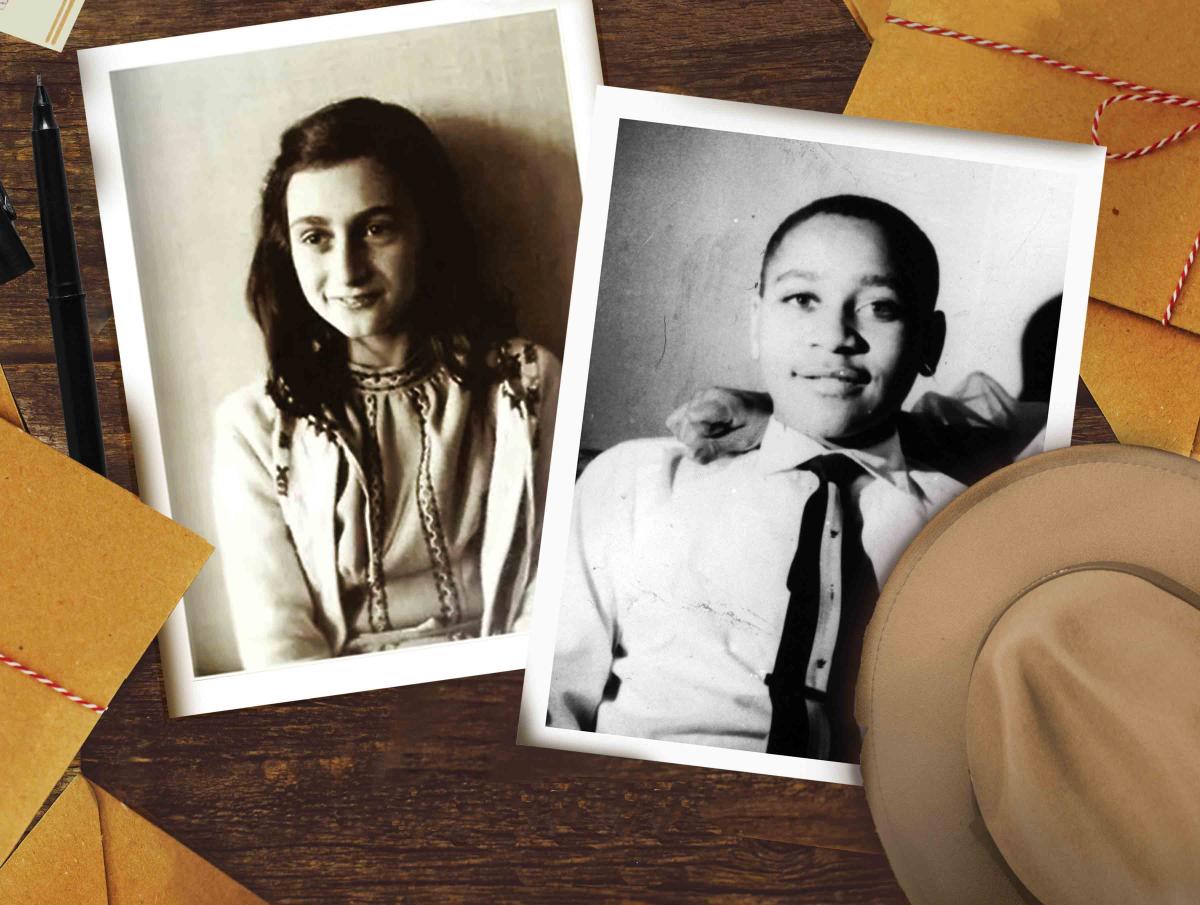In a hushed, darkened theater, actor Baxter Evans III plays Emmett Till, the fourteen-year-old boy who, in 1955, in nearby Money, Mississippi, was tortured and lynched for allegedly whistling at a white woman. An infamous act of racial violence, Till’s murder is a story that requires retelling. On stage, in the play Anne & Emmett, Evans recounts the brutality on Till’s body at the hands of kidnappers as hundreds of students from St. Andrew’s Episcopal School in Ridgeland, Mississippi, quietly absorb the awful details of this tragedy that helped launch the Civil Rights Movement.
Jade Krystal Dyer plays Emmett’s mother, Mamie Till, whose anguish, rage, and determination grow incandescent on stage. When she sings “Swing Low, Sweet Chariot,” it hangs in the air like a prayer. Several sniffles puncture the otherwise pin-drop quiet.
Anne & Emmett, written by Janet Langhart Cohen, imagines a conversation between Anne Frank and Emmett Till, both teenagers when they fell victim to intolerance and hatred. TV journalist, author, and social justice advocate Langhart Cohen wrote the play as a call to action to help eradicate racism and anti-Semitism—to repair the world in the Jewish tradition of tikkun olam. The one-act play has been produced across the United States since 2007 and also performed in Jerusalem and Amsterdam.
Anne was a Jewish girl, hiding with her family in Nazi-occupied Holland. Her diary became a major, widely discussed, report on the Holocaust and Jewish experience of World War II. Emmett was an African American boy tortured and killed in the segregated American South. His open-casket funeral focused the lens on racial violence in this country.
The two meet after death in a place called Memory, where, the play explains, they’ll exist only as long as their stories are told and remembered. They discuss why on stage:
ANNE: Someone must have imagined us together, that we were connected in some way.
EMMETT: Come on. You’re a white girl. I’m a black boy. What do we possibly have in common?
ANNE: I don’t know. Maybe someone felt we needed to talk about our lives, how we got here . . . and why. Maybe because of what happened to us when we were so young.
Though worlds apart in life, they find common ground in their experiences with cruelty and oppression, dreams cut short, and the fierce parental love that ensured their stories would be remembered for generations.
A partnership between the Mississippi Humanities Council and New Stage Theatre is bringing 15 performances of Anne & Emmett to public and private schools across Mississippi, where some of the students are experiencing live theater for the first time.
This is a history lesson that is hard to forget. “A lot of our scholars here, they’re kids, they’re used to TikTok,” said Torrey Hampton, principal at the public Forest Hill High School in Jackson. “Seeing something hands-on is a little more powerful.”
“To see these names and faces come alive as characters and hear their thoughts—it made both of their stories a little more real, a little more touching versus reading them in a textbook,” said Forest Hill sophomore Phoenix Hicks. It struck her that different oppressed groups have more in common than not. “It’s important to support one another, no matter what we’re going through.”
Following the performances, MHC staffers guide students and actors in conversation, exploring the play’s themes of memory, hate, fear, and shared humanity. MHC’s John Spann said that seeing those issues addressed in an artful and historical way helps students ask questions they probably would not otherwise. It is a chance, too, for them to learn more about the performing arts directly from cast members not much older than they are.
Students are surprised that Anne’s father, Otto Frank, survived the Holocaust and shocked that Emmett Till’s killers were acquitted. They ask questions about the killers’ confessions in Look magazine, Till’s exchange with his accuser, Carolyn Bryant, her statement at the time, and her reported recantation in the book The Blood of Emmett Till.
At Choctaw Central High, a tribal school of the Mississippi Band of Choctaw Indians, students connected Anne’s and Emmett’s experiences with those of the Choctaws during the Trail of Tears. They were keen to learn more about the history of prejudice in Mississippi and beyond, said teacher Amy Robertson.
Students from St. Andrew’s had encountered the story of Anne Frank the year before, in a student production of The Diary of Anne Frank at their school. They were generally less familiar with the gravity and impact of Emmett Till’s story, a show of hands revealed. Meanwhile, students at a public high school in neighboring Jackson knew less about Frank’s story. Both schools are only about a hundred miles from where Till was murdered.
Anne Frank and Emmett Till were not the only victims of the Holocaust and Jim Crow violence, Spann hastened to tell students. “Even though their stories were kept in memory because of their parents, we have to remember there were other Jews who were murdered in the Holocaust. . . . There were other people who lost their lives, literally, for not doing anything but being Black or fighting for their civil rights. This play is to remind you that this was not done in a vacuum.”
The message that truth is timeless, but memory fades resonated with St. Andrew’s junior Vahita Anand, who was moved and close to tears during the play.
“I think that this production is very valuable, because in addition to teaching us about the value of hope, it’s telling us that empathy, compassion, being willing to understand someone else’s story, someone else’s perspectives, is one of the most valuable things you can do,” she said.



